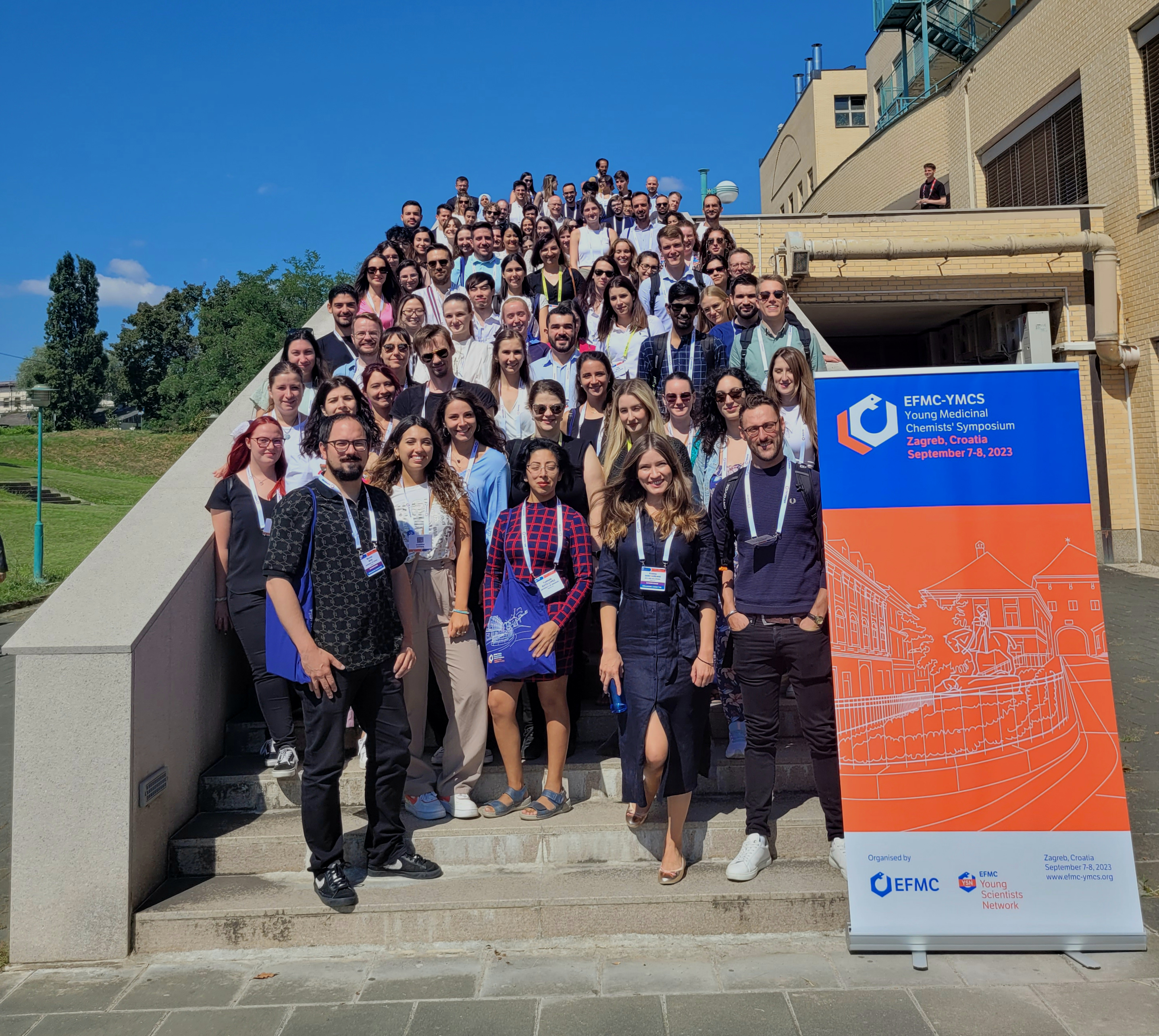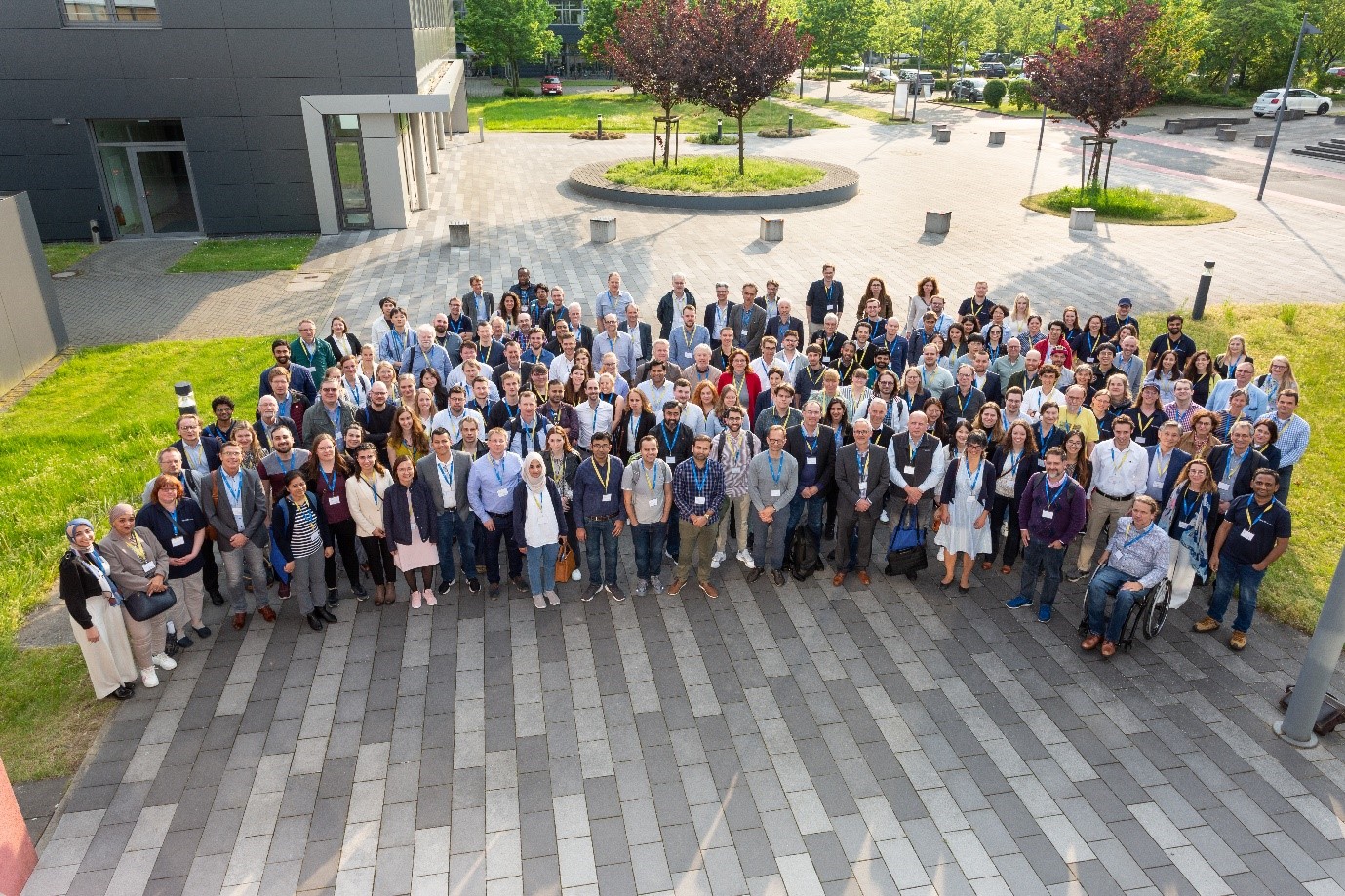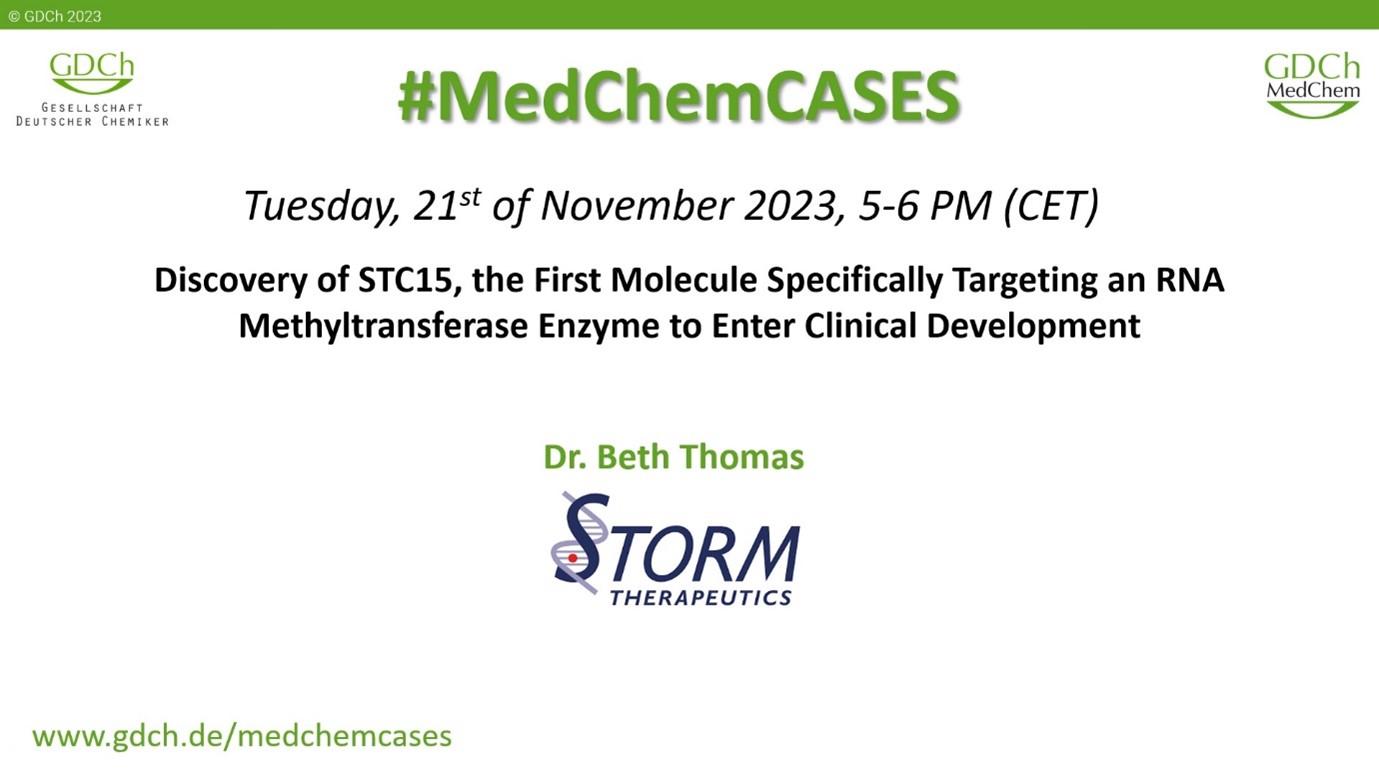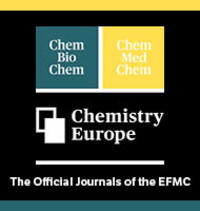|
|
EFMC AWARDS 2024 – CALL FOR NOMINATION
To acknowledge outstanding achievements in the field of Medicinal Chemistry and Chemical Biology, EFMC will confer three awards in 2024. The Awards will be presented at the XXVIII EFMC International Symposium on Medicinal Chemistry (EFMC-ISMC 2024) to be held in Rome, Italy on September 1-5, 2024.
All three awards consist of a diploma, 7.500€ and an invitation to give a headline presentation at EFMC-ISMC 2024.
Nominations for these Awards should consist of a nomination letter, a brief CV including a list of selected publications and two supporting letters. Self-nominations are also accepted. The nominations should be submitted to Dr Luc Van Hijfte, President Elect of the EFMC, via the following link.
Deadline for submission: January 31, 2024
The Award will be given for outstanding achievements in scientific research including contributions to the development of international organisational structures in Medicinal Chemistry and Chemical Biology.
To acknowledge and recognise outstanding research in the field of Medicinal Chemistry in its broadest sense by a young scientist. This Award has been established with the support of UCB Pharma.
To encourage innovation and investigation in technological development related to drug discovery, this Award, established with the support of the Prous Institute, will be given for the discovery, evaluation, or use of new technologies.
EFMC PRIZES 2024 – CALL FOR NOMINATION
To acknowledge and recognise outstanding researchers (≤ 12 years after PhD) working in European industry and academia, the EFMC established the "EFMC Prize for a Young Medicinal Chemist or Chemical Biologist in Industry" and the "EFMC Prize for a Young Medicinal Chemist or Chemical Biologist in Academia".
These two prizes are given annually and consist of a diploma, 1.000€ and an invitation for a short presentation at the XXVIII EFMC International Symposium on Medicinal Chemistry (EFMC-ISMC 2024). Two additional nominees will also be identified and acknowledged as most meritorious runners-up.
Deadline for nominations is January 31, 2024.
EFMC Prize for a Young Medicinal Chemist or Chemical Biologist in Industry
Nominations should be written by the candidate’s supervisor and consist of:
- a letter by the supervisor.
- a brief CV of the candidate.
- an abstract of the potential oral presentation.
EFMC Prize for a Young Medicinal Chemist or Chemical Biologist in Academia
Applications should consist of:
- a one-page letter by the candidate, including a short rationale for their application.
- one page with the five key publications.
- a brief CV of the candidate.
an abstract of the potential oral presentation. LITERATURE SPOTLIGHT
The “literature spotlight” section of the newsletter will bring you a summary of the recently published research in a concise and accessible way. Multiple thematics from different journals will be highlighted thanks to the valuable contribution of members of the communication team.
This contribution will focus on the recently published article “Structure-Activity Relationships, Tolerability and Efficacy of Microtubule-Active 1,2,4-Triazolo[1,5-a]pyrimidines as Potential Candidates to Treat Human African Trypanosomiasis” (by Monti et al. in ChemMedChem).
Human African trypanosomiasis HAT is a life-threatening disease caused by the flagellated protozoan Trypanosoma brucei, transmitted by tsetse flies. The disease is endemic in 36 sub-Saharan African countries. Treatment of HAT has been limited to drugs with incomplete efficacy, severe toxicity, and complex administration regimens. Despite recent advances in preclinical and clinical settings, novel treatment options are urgently needed. Monti et al. evaluated the antitrypanosomal activity of 123 1,2,4-triazolo[1,5-a]pyrimidine analogues with MT-stabilizing activity in vitro. Microtubules (MTs) are increasingly considered a potential target for treating parasitic infections such as HAT.
The in vitro screening effort identified seven compounds with EC50 values against T. brucei that were comparable to, or better than reference compound for HAT pentamidine. A subsequent in vivo evaluation in a rodent HAT model of their best two compounds revealed T. brucei levels below the detection limit within 24 h. As no evident toxicity for the host system was observed, the team created a promising set of compounds with robust antiparasitic features warranting further evaluation.
Monti, L., Liu, L. J., Varricchio, C., Lucero, B., Alle, T., Yang, W., Bem-Shalom, I., Gilson, M., Brunden, K. R., Brancale, A., Caffrey, C. R., Ballatore, C., ChemMedChem 2023, 18, e202300193.
CHEMMEDCHEM & CHEMBIOCHEM, THE OFFICIAL JOURNALS OF EFMC
EFMC-YSN PUBLISHING ACADEMY, POWERED BY CHEMISTRY EUROPE
The publishing academy is an intensive workshop covering topics on writing, publishing, and general communication that will be helpful for early-career researchers. The academy will be hosted and coordinated by the EFMC’s Young Scientists Network with workshops run by professional editors from Chemistry Europe / Wiley-VCH.
The seminar & interactive workshop will take place on November 14, 2023 and the deadline to register and submit your manuscript is November 7, 2023.
The workshop is open to all members of the EFMC-YSN but limited to 15 participants. The draft of a journal manuscript is needed to register. All participants must also allow their title and abstract to be shared among the speakers and participants for the session.
More information can be found on the website: www.efmc.info/publishing-academy
CONTENT
DAY 1: Seminars & Interactive Workshop (Full Day)
- Editorial Blackbox: The publishing process explained; tips for submitting manuscripts
- Scientific Writing: Practical tips for writing, covering grammar and writing pitfalls
- An Ideal Manuscript: Optimizing sections of a peer-reviewed manuscript
- Optimizing Titles and Abstracts: workshop on actual samples; participants will be asked to edit their titles/abstracts overnight as an assignment. We may also consider data
- Communicating Your Science: Tips for poster and oral presentations
DAY 2: Individual feedback
Each participant will have a one-on-one session with an editor who give constructive feedback on their manuscript and their edited titles and abstracts. 10th EFMC YOUNG MEDICINAL CHEMISTS' SYMPOSIUM (EFMC-YMCS 2023) – SHORT REPORT
For its 10-year Anniversary Edition, the EFMC Young Medicinal Chemists' Symposium took place amidst the heights of Zagreb, Croatia, immediately following the IX EFMC International Symposium on Advances in Synthetic and Medicinal Chemistry (EFMC-ASMC 2023). Over the course of two busy days, the University of Zagreb hosted the 130 attendees, fostering vivifying discussions and scientific insights.
The symposium's programme for this year featured 3 distinguished keynote lectures, 18 oral presentations by invited prize winners from national young medicinal chemist meetings across Europe, 2 prize lectures and 18 flash poster presentations.
The symposium began on Thursday, September 7, with a warm welcome from the chairs, Dr Maja Beus (Duke University, USA) and Dr Hrvoje Rimac (Selvita, HR). Dr Sanja Kostrun (Selvita, HR) provided the audience with her opening lecture, "Druggability Beyond the Rule of Five", before leaving the stage to the competition between the oral communications, and the first set of flash poster presentations. Closing the first day, the EFMC Young Scientists Network (EFMC-YSN) offered an optional programme that included a workshop by Reaxys, led by Dr Giulia Moncelsi.
The second day commenced with a stimulating Career Panel Discussion, organised by the EFMC-YSN, featuring early-career talents from both industry and academia. Prof. Thomas Poulsen (Aarhus University, DK) launched the scientific programme with his talk, "Leveraging Natural Products to Develop New Therapeutic Leads Targeting Resistant Tumors." The best oral communication contest resumed over the course of the day, as well as the second set of flash poster presentations.
The conference was also the stage for two prize lectures: The 2023 EFMC-YSN PhD Prize, awarded to Mrs Zuzanna Kozicka (Friedrich Miescher Institute for Biomedical Research, CH) and the 2023 Symeres PhD Prize for Excellence in Chemistry in Life Sciences Research, received by Dr Jan G. Felber (Universität München, DE). The symposium closed with an interesting lecture by Dr Yves P. Auberson (Novartis, CH) on "Trends in Medicinal Chemistry and Chemical Biology."
Throughout the event, networking was at the heart with a welcome reception and networking event offered by the EFMC-YSN and two poster sessions showcasing nearly 70 posters.
Celebrating Excellence: Awards and Recognition
The award ceremony recognised the following champions:
- Ms. Nina Compagne (University of Lille, FR) received the EFMC-YMCS Presentation Prize, sponsored by the EFMC and Idorsia, for her presentation on "Optimization of a Pyridylpiperazine Series as a Novel Class of Efflux Pump Inhibitors in E. Coli to Combat Antimicrobial Resistance."
- Ms. Lauren Voets (KU Leuven Research and Development, BE) was rewarded with the EFMC-YMCS Best Flash Poster Prize, sponsored by Selvita, for her presentation on "Design, Development, and Evaluation of Novel Anticancer Drugs Targeting Protein Kinase D2 (Pkd2)."
- Dr. Li Gao (Roche, DE) was awarded with the EFMC-YMCS Public's Choice Prize, sponsored by Roche, for his presentation on "Styrylbenzothiazole Photoswitches for Spatiotemporal Control over Microtubule-Dependent Biology."
Additionally, three deserving participants received the EFMC-YMCS Best Poster Prizes, sponsored by Chemistry Europe:
- Poster 024: Alex Hallatt (Newcastle University, UK)
- Poster 055: Rebecca Stevens (GSK/University of Strathclyde, UK)
- Poster 062: Wenxin Felix Zhu (Goethe Universität Frankfurt, DE)
We extend our sincerest gratitude to all the committee members, speakers, sponsors, exhibitors, and, most importantly, the participants for their invaluable support. We look forward to meeting all of you in Rome, Italy, for the 11th EFMC Young Medicinal Chemists' Symposium (EFMC-YMCS 2024), set to take place on September 5-6, 2024.

EFMC-ISCB 2023 | ONE DAY PASSES AVAILABLE!
Registrations are still open for the 1st edition of the EFMC International Symposium on Chemical Biology (EFMC-ISCB 2023) organised jointly by the EFMC and the Swiss Chemical Society, Division for Medicinal Chemistry & Chemical Biology (DMCCB).
A strong line-up of speakers showcasing the most recent advances in the field of chemical biology, more than 120 posters submitted by peers and early-career researchers, a commercial exhibition featuring 20 companies and an interesting social programme is to be expected!
One-day access is possible for industry affiliated researchers from the greater Basel area.
More information and registration on www.efmc-iscb.org.
2024 IUPAC-RICHTER PRIZE IN MEDICINAL CHEMISTRY – CALL FOR NOMINATION
The 2024 IUPAC-Richter-Prize will be presented during the XXVIII EFMC International Symposium on Medicinal Chemistry (September 1-5, 2024) in Rome (Italy) and the recipient will also give a lecture on the subject of their research at the 38th ACS National Medicinal Chemistry Symposium (June 23-26) in Seattle, WA, United States. The prize is to be awarded to an internationally recognized scientist, preferably a medicinal chemist, whose activities or published accounts have made an outstanding contribution to the practice of medicinal chemistry or to an outstanding example of new drug discovery
Prize USD 10 000
The Prize has been established by a generous gift from the Chemical Works of Gedeon Richter, Plc. (Budapest, Hungary) to acknowledge the key role that medicinal chemistry plays toward improving human health.
Applicants should be received by NOMINATION only, with just one person needing to serve in that capacity, although a total of five (5) individuals should be listed as referees overall. The package must be submitted electronically and should contain a complete resume, a professional biography of not more than two pages, and a one-page summary of what the individual considers to be their activities, accomplishments and/or publications that have had the most significant impact upon the field of Medicinal Chemistry. The material will be forwarded confidentially to an independent selection committee appointed by the IUPAC Subcommittee on Medicinal Chemistry and Drug Development.
For further information please contact Prof. Janos Fischer, Member of the IUPAC Subcommittee on Drug Discovery and Development, by email at mailto:j.fischer@richter.hu.
Nomination materials should be uploaded by 15 December 2023 to IUPAC Secretariat via the following form. EFMC ADVENT CALENDAR – CALL FOR PICTURES
The EFMC Communication Team is already preparing for the Holiday Season and invites you all to contribute to its Social Media Advent Calendar.
As of December 1st, we will share your most festive picture on the EFMC X (ex-Twitter) & Instagram accounts. The most-liked picture by December 24th noon CET will win a 50€ prize and an EFMC GoodieBox.
How to participate?
- Share your picture by PM via X, or
- Tag us from a public account on X (@EuroMedChem) or Instagram (@euromedchem), or
- Share your picture and details via email to communication@efmc.info
GET TO KNOW GEORG WINTER, CeMM, AUSTRIA
In this edition, our MedChemBioConversations is with Georg Winter from the Research Center for Molecular Medicine of the Austrian Academy of Science. Georg is also the winner of the 2023 edition of the EFMC Prize for a Young Medicinal Chemist or Chemical Biologist in Academia.
Get to know him better by reading the interview below:

How did you get interested in Chemical Biology?
I got fascinated about chemical biology when realizing that (i) we don’t know the molecular mechanism of action of many approved drugs and (ii) many drugs are non-selective and, in fact, block different proteins and associated pathways. To me, this was absolutely stunning.
What was the topic of your PhD project? Where and when did you obtain your PhD diploma?
I conducted my PhD studies at CeMM under the supervision of Prof. Giulio Superti-Furga, mostly focusing on chemical proteomics, functional genomics as well as drug combination studies to understand the mechanism of action of anti-cancer drugs. For my postdoc, I worked with Jay Bradner at the Dana Farber Cancer institute. This is when I fell in love with the paradigm of targeted protein degradation.
Where are you currently working and what is your current position?
I am currently a principal investigator at CeMM where I lead a multi-disciplinary research team of 12 scientists working in chemistry, molecular biology, and bioinformatics.
What are your current research interests?
We are excited about the concept of “chemical neomorphs” or, in other words, small molecules that allow us to endow a target protein with a novel function. This includes target protein degradation via PROTACS and molecular glues where we functionally reprogram E3 ubiquitin ligases to induce the degradation of disease-relevant proteins. But increasingly, it also goes beyond that.
What kind of tasks does your work involve?
Unfortunately, I don’t find the time to do experiments anymore. Hence, most of my tasks are around communicating, brainstorming, and organizing our research. Thinking about a scientific problem and discussing it with my students and postdocs is what I like best. Of course, it also includes presentations at meetings and conferences, and writing research grants.
How many PhD students and postdocs do you currently supervise? Are you currently looking for a new PhD student or a postdoc?
7 postdocs and 4 students. We are always excited for curious and courageous people that want to work in our team.
How would you describe yourself as a supervisor?
I think I am very approachable and easy to excite and, hopefully, empathic. However, I think I am also somewhat demanding but try to ignite intrinsic motivation rather than applying external pressure.
What are the features of a successful PhD student or postdoc?
You need to love what you are doing, and you need to constantly check if you are asking the right/most interesting questions. Talk to your peers. Get them excited. Don’t be afraid to cross scientific boundaries and involve different disciplines. Dream big and be resilient.
What do you consider your greatest achievement in your scientific career?
My postdoctoral work (Winter, Buckley et al. Science 2015) where we could show, for the first time, in vivo degradation of a protein via an all-chemical degrader is probably the most influential work (>1200 citations).
Which of your papers are you most proud of and why?
Among others, the following come to mind:
- A 2014 Nat Chem Bio paper where we elucidate the MoA of the anti-cancer compound YM155
- A 2017 Nature paper where we have developed a degron technology to validate ENL as a target in acute leukemia
- A 2020 Nature Genetics paper where we use the same degron technology to systematically dissect a transcriptional coactivator complex
- A 2020 Nat Chem Bio paper where we describe a rational approach to identify molecular glue degraders
- A 2023 Nat Chem Bio paper where we describe resistance mechanisms to small-molecule degraders
What is the most embarrassing thing you have done in the lab while doing experiments, e.g. explosions?
I once ordered a large flask of ethanethiol and opened it outside the fume hood. We had to evacuate the lab due to the horrific smell.
What are your recommendations for a book, podcast, website, blog, YouTube channel or film?
I enjoyed reading “Empire of Pain”, telling the shocking story of the Sackler family, Purdue Pharma and OxyContin. I also loved “For Blood and Money”, a book that details the fascinating development of the clinically highly successful BTK inhibitors.
What would you expect to be the next major breakthrough in medicinal chemistry?
Proximity-inducing small molecules. I am convinced that targeted protein degradation is just chapter one. We will find more and more strategies to rationally rewire biological circuits and I think we will witness a convergence of chemical biology and synthetic biology. Of course, aspects of that will be critically empowered by artificial intelligence and machine learning. REPORT OF THE 3rd INTERNATIONAL HELMHOLTZ DRUG DISCOVERY CONFERENCE (HDDC)
The 3rd international Helmholtz Drug Discovery conference (HDDC) took place on May 15-16, 2023, in Braunschweig, Germany, attracting 230 participants. The conference provided a stimulating platform to discuss the state of the art in drug discovery with academic experts and scientists from biotech and pharmaceutical industries.
The local host was the Helmholtz Centre for Infection Research, henceantiinfectives constituted a major topic. Sessions on ‘Anti-infectives from Innovative Drug Formats’ and ‘Antibiotic Drug Discovery’ were framed with keynote talks from Claudia Zampaloni (Roche Basel), Ulrike Protzer (TU Munich), Rolf Müller (HIPS Saarbrücken) and Kelvin Wu (Harvard, Cambridge).
Keynote talks from Ben Davis (Oxford), Ivan Dikic (Frankfurt) and Teresa Carlomagno (Birmingham) highlighted the topic ‘From Biological Mechanisms to Novel Drug Targets’. The latest research in chemical biology was presented by Stuart Conway (UCLA) and Christa Müller (Bonn).
On the second day, the hot topic ‘Artificial Intelligence in Drug Discovery’ was discussed by Matthias Rarey (Hamburg) and Ole Engkvist (Gothenburg). The importance of synthesis was underlined in the last session entitled ‘Chemistry-driven Drug Innovation’ with talks from Erick Carreira (ETH Zürich), Eric Fischer (Dana Farber, Boston), and Masatoshi Hagiwara (Kyoto University).
Beyond the keynotes, 16 additional talks and a session with 77 posters gave an overview on latest results in drug discovery. In addition, two workshops on ‘drug-repurposing‘ and ‘3D Modeling for the non-savvy” were organized by Fraunhofer ITMP and BioSolveIT, respectively.
The conference was accompanied by an industry exhibition and supported by 15 sponsors (platinum sponsor: Roche).
The HDDC proved to be an excellent format to discuss the challenges and chances of modern drug discovery in academia and industry and Helmholtz Health Researchers plan continuing the series in the future.

REPORT OF THE 3rd RSC-BMCS SYNTHESIS IN DRUG DISCOVERY AND DEVELOPMENT CONFERENCE
The 3rd RSC-BMCS Synthesis in Drug Discovery and Development conference was held in May 2023, celebrating the crucial role of synthetic chemistry in the success of drug discovery in development. Following positive feedback from earlier iterations, the conference was maintained as an online event allowing a global audience to hear speakers presenting from across Europe and the US.
Highlights from the event included a session led by Susannah Coote (Bath) and Olivia Garry (Princeton), showcasing the use of photochemistry to make medicinally relevant molecules, and Phil Baran (Scripps) closing the conference with a talk entitled “Simplifying Synthesis with Electricity”.
Also of great interest to the audience, given the 1st conference was held online during COVID restrictions, was Kaitlin Gray (Pfizer) describing how the COVID-19 Oral Protease Inhibitor PF-07321332 has been taken at unprecedented speed from milligrams to metric tons.
Alongside the oral speaker programme, an online poster session was held featuring 14 posters which can still be viewed at the event website (https://www.rscbmcs.org/events/sddd23/). Poster presenters also provided pre-recorded flash talks which were played during the conference.
#MEDCHEMCASES - SEMINAR BY THE DIVISION OF MEDICINAL CHEMISTRY OF THE GERMAN CHEMICAL SOCIETY (GDCH)
The MedChem Division of the German Chemical Society (GDCh) would like to invite you to the next #MedChemCASES online seminar which will be held on November 21 by Dr Beth Thomas (Storm Therapeutics)
The topic of the webinar will be “Discovery of STC15, the First Molecule Specifically Targeting an RNA Methyltransferase Enzyme to Enter Clinical Development”.

RNA epigenetics is an unexplored and exciting field for drug discovery. While post-transcriptional RNA modifications have been known for over 30 years, their mechanism and functional consequences have only recently begun to emerge. STORM Therapeutics is the first company devoted to pursuing RNA-modifying enzymes as drug targets. Tackling new classes of enzymes such as RNA methyltransferases generates challenges in assay development, screening, and downstream hit to lead progression. This talk will describe some of the challenges we have faced in prosecuting our RNAMT programmes and the techniques we have developed to meet them. We will also describe the discovery of our first-in-class oral METTL3 inhibitor STC-15, the first inhibitor of an RNA methyltransferase to enter clinical development and share emerging data from the phase one clinical trial.
Register for free here.
#GDCh (MedChem Division), #NextGenMedChem. NEWS FROM THE BIOLOGICAL AND MEDICINAL CHEMISTRY SECTOR (BMCS) OF THE ROYAL SOCIETY OF CHEMISTRY (RSC)
The BMCS is pleased to announce upcoming events.
Hot Topics: Targeting RNA
30th November 2023, Virtual
Registration is now open!
Website: https://www.rscbmcs.org/events/hottopicsrna23/
Synopsis: The BMCS Hot Topics online meetings are intended to highlight breaking areas of research in fields of science relevant to drug discovery. They will run as stand-alone half-day virtual events, 2-3 times per year. The programme will be targeted towards researchers working in academia or industry who would like to enhance their understanding of these nascent or developing fields. The inaugural meeting will cover relevant methods and modes of targeting RNA in drug discovery and will focus on how small molecules can accomplish this, including RNA binding and degradation, splicing modulation, and enzymes modifying RNA. There will be presentations from leading academics and industry.
RSC-BMCS Postgraduate symposium XVII
7th December 2023, University of Oxford, Oxford, UK
Registration is now open!
Website: https://www.rscbmcs.org/events/psxvii/
Synopsis: This face to face meeting will comprise an oral and poster presentations from PhD students and post-doctoral workers researching in biological or medicinal chemistry. In addition, the agenda will feature invited keynote speakers from industry and academia.
9th RSC-BMCS Fragment-based Drug Discovery Meeting
3rd – 5th March, 2024, Hinxton Hall Conference Centre, welcome Genome Campus, Cambridge, UK
Abstract submissions and registration is now open!
Website: https://www.rscbmcs.org/events/fragments24/
Synopsis: The aim of the 9th RSC-BMCS Fragment-based Drug Discovery meeting will be to continue the focus on case studies in Fragment-based Drug Discovery that have delivered compounds to late stage medicinal chemistry, preclinical or clinical programmes. The Fragment series was started in 2007 and continues with this theme in having over three-quarters of the presentations focused on case studies. This will be complemented by technology progress in high concentration, NMR, SPR and X-ray screening.
The BMCS Mastering MedChem VIII: 8th RSC-BMCS Symposium on Mastering Medicinal Chemistry
15th March, 2024, Burlington House, London, UK
Registration is now open!
Website: https://www.rscbmcs.org/events/mastermedchem24/
Synopsis: Mastering Medicinal Chemistry VIII is the latest in an ongoing series of conferences intended to provide expert advice and guidance to new practitioners in the field of drug discovery. It has been said that “there are two types of drug discovery programmes: those that hit serious problems and those that are going to hit serious problems”. Anticipating and preparing for such problems thus accelerates the delivery of new medicines: this event will feature presentations from experienced ‘drug-hunters’ in both industry and academia, who will talk about the challenges faced in modern drug discovery, and will share best practice common to all successful medicinal chemists.
35th Medicinal Chemistry in Eastern England (Hatfield symposium)
25th April 2024, Fielder Centre, Hatfield, UK
Oral abstract submissions are now open! Submit your abstract here!
Website: https://www.rscbmcs.org/events/mcee35/ Synopsis: Known colloquially as the “Hatfield MedChem” meeting, this is a highly successful, long-standing, one-day meeting that runs annually. The scientific program will comprise presentations showcasing medicinal chemistry case studies from tools to candidates, across a range of modalities, therapeutic areas and target classes, as well as covering more general topics at the forefront of drug discovery. The meeting aims to be informal and interactive, and is ideal for all those working in medicinal chemistry and drug discovery more widely.
4th Synthesis in Drug Discovery and Development
4th – 5th June, Virtual
Date for your Diary! |
|
|
|
|
|
ISSUE SPONSORED BY

EFMC ORGANISED EVENTS
November 16-18, 2023
Basel, Switzerland
EFMC International Symposium on Chemical Biology (EFMC-ISCB)
November 28, 2023
Virtual Event
EFMC² Tandem Talks
April 8-11, 2024
Utrecht, The Netherlands
EFMC-ACSMEDI Medicinal Chemistry Frontiers 2024
April 21-24, 2024
Oegstgeest, The Netherlands
18th EFMC Short Course on Medicinal Chemistry
September 1-5, 2024
Rome, Italy
XXVIII EFMC International Symposium on Medicinal Chemistry (EFMC-ISMC 2024)
September 5-6, 2024
Rome, Italy
11th EFMC Young Medicinal Chemists' Symposium (EFMC-YMCS 2024)
EFMC SPONSORED EVENTS
December 7, 2023
Oxford, United Kingdom
RSC-BMCS Postgraduate Symposium XVII
December 8, 2023
Brussels, Belgium
MedChem 2023
January 24-26, 2024
Orsay, France
SCF Chemical Biology Symposium 2024 – Chemistry meets Biology
January 28-February 1, 2024
St. Anton, Austria
4th Alpine Winter Conference on Medicinal and Synthetic Chemistry
JOB PORTAL
PostDoc in Medicinal Chemistry, Institut Pasteur de Lille, FRANCE
Read more
PostDoc in Drug design and pharmacology, Medical University of Vienna, AUSTRIA
Read more
Affinity Selection Mass Spectrometry Scientist/Lead Scientist, Sygnature Discovery, UNITED KINGDOM
Read more
Associate Principal/Principal Scientist - DMPK, Sygnature Discovery, UNITED KINGDOM
Read more
Bioanalytical DMPK Scientists/Senior Scientists, Sygnature Discovery, UNITED KINGDOM
Read more
Internship in Global Discovery Chemistry, Novartis, SWITZERLAND
Read more
|
|
